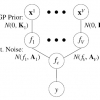Free Online Productivity Tools
i2Speak
i2Symbol
i2OCR
iTex2Img
iWeb2Print
iWeb2Shot
i2Type
iPdf2Split
iPdf2Merge
i2Bopomofo
i2Arabic
i2Style
i2Image
i2PDF
iLatex2Rtf
Sci2ools
106
Voted
CVPR
2009
IEEE
2009
IEEE
Co-training with Noisy Perceptual Observations
Many perception and multimedia indexing problems involve datasets that are naturally comprised of multiple streams or modalities for which supervised training data is only sparsely available. In cases where there is a degree of conditional independence between such views, a class of semi-supervised techniques based on maximizing view agreement over unlabeled data has been proven successful in a wide range of machine learning domains. However, these ‘co-training’ or ‘multi-view’ learning methods have had relatively limited application in vision, due in part to the assumption of constant per-channel noise models. In this paper we propose a probabilistic heteroscedastic approach to co-training that simultaneously discovers the amount of noise in a per example basis, while solving the classification task. This results in high performance in the presence of occlusion or other complex observation noise processes. We demonstrate our approach in two domains, multi-view object recogniti...
Related Content
| Added | 09 May 2009 |
| Updated | 10 Dec 2009 |
| Type | Conference |
| Year | 2009 |
| Where | CVPR |
| Authors | Ashish Kapoor, Chris Mario Christoudias, Raquel Urtasun, Trevor Darrell |
Comments (0)

